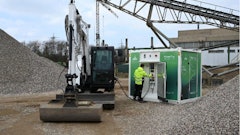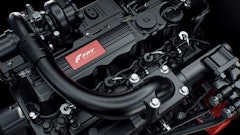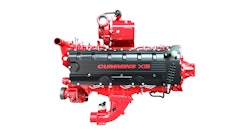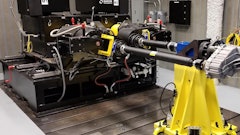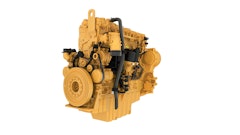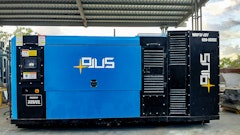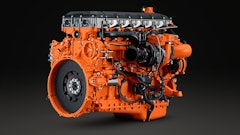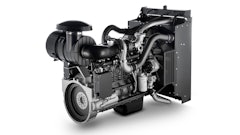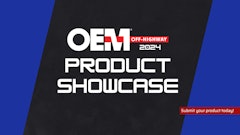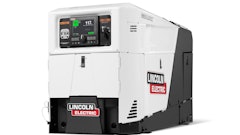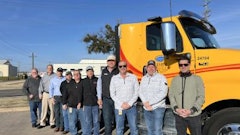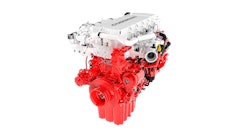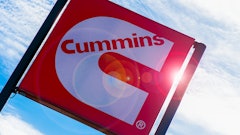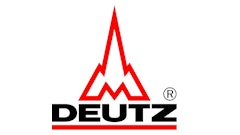Shell Lubricants will simplify the marketing of its heavy-duty motor oils with a portfolio of Rotella products that provides a “ladder of protection”.
“Shell looked at the technology that goes into its different engine oils and how to bring them to market,” says Mark Reed, global brand manager, Shell Rotella, Houston, TX. “We decided to simplify the portfolio by consolidating brands into a tiered line of Rotella-branded engine protection.”
In the first quarter of 2010, Shell Lubricants’ heavy-duty engine oil brands (Shell Rimula, Pennzoil Long Life and Quaker State HDX) will be consolidated under the Shell Rotella “Energized Protection” portfolio. Shell Lubricants’ CI-4 PLUS engine oils will be phased out by the end of 2009 (Shell multi-grade engine oils meet CJ-4 standards).
As diesel engine technology continues to change, engine oil must also evolve. Lubricant specialists such as Shell are engineering oils that will protect today’s and tomorrow’s engines. At an event held at Richard Childress Racing’s headquarters in Welcome, NC, in September, the company announced its strategy and introduced a synthetic blend engine oil and a new formula for its full synthetic engine oil in the Rotella line.
The new formula for Shell Rotella T6 full synthetic oil features an advanced multi-functional, low-ash additive in a synthetic base oil which adapts to engine conditions. The use of select low-viscosity synthetic base oils energizes the oil’s capabilities, and promotes fuel-economy performance and durability.
Shell Rotella T5 10W-30 synthetic blend technology, which delivers better fuel economy than Shell Rotella T Triple Protection 15W-40 oil, expands the product line of heavy-duty engine oils.
“Because Shell Rotella heavy-duty diesel engine oils provide protection in critical areas, engine life can potentially be extended and maintenance costs reduced,” says Dan Arcy, OEM technical manager, Shell Lubricants. “Shell Rotella T5 10W-30 and Shell Rotella T6 offer improved fuel efficiency and protect the performance of exhaust-emission control systems, and Shell Rotella T Triple Protection demonstrates the ability to provide added wear protection compared to previous formulations.”
Shell Rotella T Triple Protection oils help control wear, deposits and emissions to continuously adapt to the needs of the engine for protection in on- and off-highway applications. It meets or exceeds API CJ-4 requirements. Shell Rotella T Triple Protection performs well in old and new engines.
According to Shell, Rotella oils provide engine protection in three areas:
- Acid control: helps protect against corrosion from acids formed as fuel burns
- Deposit control: helps keep engines clean for optimum performance and long life
- Wear control: helps keep moving metal engine surfaces apart for long life
“Energized Protection,” Shell’s brand for the adaptive technology it has designed into Rotella oil, helps the lubricant protect in a variety of operating conditions by physically or chemically reacting to engine conditions.
Development, education for the real world
Shell’s Rotella line of oil is supported by 35 years of development and real-world use, including 40 million miles of endurance testing.
Eight of Shell Lubricant’s 10 research and development centers located around the world are devoted to lubricants research, and more than 200 staff those facilities.
Changing engines are a concern for operators. “When we look at what will be different for 2010, we’re told it’s anywhere from ‘nothing’ or ‘something’, depending on the OEM. All of the vision that Shell has for new technology must be tied into real life,” says Chris Guerrero, fleet & construction marketing manager, Shell Lubricants.
“We maintain the link to what the customer requires. Regardless of whether an OEM goes with SCR or EGR for controlling emissions, there are maintenance concerns. Drivers want to know, “what’s going to happen with my truck?’ We are always having these conversations with our customers. It impacts our business, even if it’s not directly impacting lubricants.”
Engine changes can affect American Petroleum Institute (API) Service Categories for engine oil. Guerrero says that for 2007 on-highway engines, there were significant changes. API’s classification for CJ-4 oil means protection against particulate filter blocking, piston deposits, low- and high-temperature stability, soot handling properties, oxidative thickening, foaming, viscosity loss, and more.
“Some of the big challenges we have with modern engine oils,” says Reed, “is when you add components to control emissions, you create higher temperatures. In addition, the higher acid levels caused by EGR systems can impact oil durability, and running higher fuel injector pressures can cause more soot particles.”
Reed says the new CJ-4 formulas will meet engine requirements for on- and off-highway applications at least until 2014, when Tier 4 engines will enter the off-highway marketplace. “When we developed Rotella T, we formulated it to exceed the base requirements. It will already handle the extra soot that is going to be an issue for 2010, and in off-highway engines in the near future.”
Although the product is ready for 2010 regulations, Shell Lubricants’ R&D labs are busy. “We are working on future technologies with oil, anticipating challenges that might come with the new engines,” says Reed. “Shell works closely with OEMs, which are concerned about fuel economy and emissions while giving ultimate wear protection.”
One of the trends Reed has noticed is that OEMs are looking at switching to a lighter viscosity, and the extra price of synthetic oil is becoming less of an issue. To that end, Shell has introduced the Rotella T5 line with 10W-30 and 10W-40 semi synthetic oil, featuring extra wear properties and better fuel economy. Viscosity has the same affect on engines, and therefore fuel economy, as the energy that would be required to swim in a pool of water versus one filled with honey.
In many ways, OEMs are ahead of the curve, driving a switch to synthetic oils in a lighter viscosity. At this point, end-user education is important. “OEMs might factory-fill with a lighter viscosity product, but then a diesel mechanic who has used a certain type for a number of years will poor a thicker product back in the engine. It will take some time to get their mind changed.”
As a way to educate those who depend on engine oil, Shell also rolled out a remodeled Rotella Road Show mobile display unit during the event at Richard Childress Racing’s headquarters.
Organized with the assistance of The Kerry Group, a St. Louis-based brand activation agency, the Road Show showcases the newly repositioned Rotella line of oils at trade shows and customer locations throughout North America.
At the front of the 53-ft. semi-trailer is a new International Lonestar tractor. The front of the trailer holds a a surround sound theater with air ride seating, while toward the rear a walk-through mobile display features visual demonstrations of the capabilities and benefits of Shell Rotella engine oils including engine parts displays, test results and a display showing a year’s worth of ash buildup in a diesel particulate filter.





